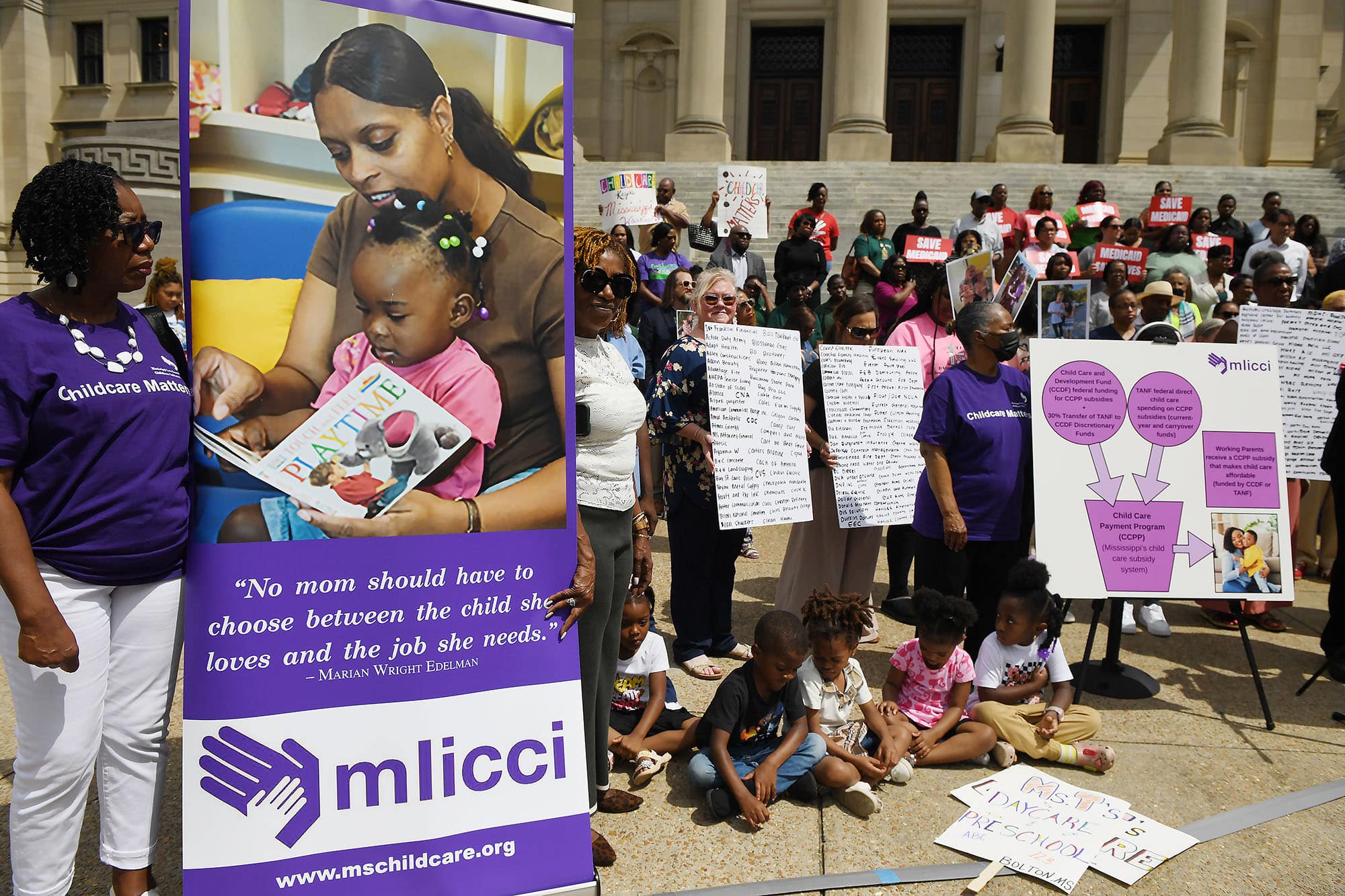Mississippi Today
Reddit AMA recap: Rankin County Sheriff Bryan Bailey’s chicken farm

Investigative Reporters Steph Quinn and Mukta Joshi answered your questions on Reddit about their investigation that uncovered allegations that Rankin County Sheriff Bryan Bailey used inmates in his custody to work on his family’s chicken farm.
Some former inmates said they fixed his personal vehicles. One even said she gave his wife back massages.
Read their answers below and read the full story here.
Some questions have been edited for length and clarity.
Q: Was there any point in your investigation when you felt concerned for your personal safety? Did any of the former inmates express concern about their safety as a consequence of sharing their stories?
Click for Mukta Joshi’s answer.
Almost every single former inmate we spoke to (except the few who were happy to go on the record about their positive experiences) were worried about their safety and preferred to remain anonymous. Especially those who still live in Rankin County. Keep in mind that the law is not kind to repeat or habitual offenders of any kind, and all of these folks had at least one felony on their record, making them very worried about getting in any sort of trouble again.
We definitely noticed a culture of fear. Multiple male former trusties told us they try their best to stay out of Rankin County at all times.
For us, it wasn’t so bad. I will say it was a difficult story to report, especially as the press is increasingly perceived and treated with animosity by public authorities that ought to be transparent and answerable to the people. But we made every effort to be safe, responsible, and most importantly fair to the subjects of our reporting. It definitely helps to know that you’re doing everything in your power to dot your i’s and cross your t’s.
Click for Steph Quinn’s answer.
More than one male former trusty said they avoid Rankin County because they’re concerned officers will find any reason to pull them over – if they’re going 10 over the speed limit on the highway, for example. I remember when we asked one former trusty if he’d be willing to have his hands photographed for the story – keeping him anonymous, but still featuring a photo of him – he suddenly sounded so scared, and it really hit home for me the fear of retaliation that some former inmates feel, often after having really horrific experiences in the jail. Sometimes I imagine an alternate reality where it would be safe for them to openly tell their full stories – everything they’ve been through, how much they’ve grown – alongside their photos.
Q: In your article, there was a quote from one of the supervisors which claimed that they had no authority over the Sheriff’s budgets.
In your reporting for this story, were you able to review the specific budget documents, invoices, purchase orders etc? If so, whose name was on these documents as signing off on them being approved purchases? Is there any evidence that these purchases were made with seized drug money? If so, what would the evidence be for that?
Click for Steph Quinn’s answer.
I wish I had a better answer to this question! We had really, really hoped to be able to sit down with members of the Board of Supervisors and talk about the purchasing process, who from the Board of Supervisors has to approve what and when, and whether there’s a review process of sheriff’s department purchases after money has been budgeted for the department.
In short, the documents we have don’t show anyone in particular signing off on purchases. And yes, there is clear evidence that some of the purchases – such as the skid steer that Sheriff Bailey allegedly stored on his mother’s farm that was used to clear land – were made with seized drug money. We know that because the sheriff’s department’s budgeted funds are in a different “pot” of money from seized drug money. We had to request the documents separately, and some of the drug seizure purchases are explicitly labeled as such in the description column for the purchase. We also confirmed about the skid steer with a source who’s a former deputy.
And we tried hard to talk with supervisors, to no avail. When Mukta emailed one of the supervisors asking for an interview, the sheriff’s department’s lawyer replied to the email, saying no one from the county would talk with us. We showed up in person to the supervisors’ office, called and even asked the supervisors for an interview during a monthly BoS meeting. The answer was always the same.
Q: Do you think it will be more difficult in the current political climate to hold Bailey accountable for his misuse of actual people?
We seem to be okay with some pretty questionable behaviors from government officials, and Bailey is still sheriff after several other heinous allegations have been made public.
Click for Mukta Joshi’s answer.
Don’t mean for this to sound like a cop-out (no pun intended) but it seems like only time will tell. You are correct that it has gotten way more difficult to hold law enforcement accountable as the Department of Justice under this administration has deprioritized police reform. But the response this story received from within the Rankin County community was something that none of us had expected. People seem really, really angry. And sometimes, that’s the best part of local reporting: even if it doesn’t trigger reform at the very top, it can change minds within the community, and that can sometimes end up being even more impactful.
Click for Steph Quinn’s answer.
Quite possibly. There’s what’s happening at the federal level. The state auditor’s office has opened an investigation into the allegations from our story, but that office can’t prosecute. In addition to the allegations that the sheriff used inmates to work on the chicken farm, there are also the allegations that he used county property and resources, such as gravel and the skid steer, for his personal benefit. It’s possible that some of those allegations are more actionable from a legal standpoint than others, but I can’t really say. Time will tell!
Q: Were there ever reports of inmates being injured or ill after working for them, especially at the chicken farm? I cannot imagine and PPE being used and chicken barn dust is no joke. As an aside, it’s sad that the only thing the female inmates seem to be allowed to do is clean and office work. Did they ever produce the rules of the program for men or disciplinary policies for either sex? I don’t understand how you can have such a program without thoroughly planned out and documented policies.
Click for Mukta Joshi’s answer.
That is a GREAT question and something we will definitely start looking into. I will say, chicken farm-related injuries and illnesses didn’t come up while we were reporting for these stories, but we did certainly hear that it was not pleasant work at all. It involved, like Christian Dedmon said in that text to his then-wife, being “covered in chicken shit.” Which I personally have not experienced before but does not sound fun.
About the female inmates being relegated to cleaning (with the occasional exception of secretarial work) – man, we noticed that too! It was interesting because you would think at least partially, the idea behind working in jail would be to build skills for post-release life. And while the men had the opportunity to practice a bunch of different trades – which some of them continue to do in the “free world,” such as electric work and auto repair – some female trusties who started working after jail are doing just that: cleaning. Nothing wrong with cleaning, obviously, but it is undeniably very gendered work.
Click for Steph Quinn’s answer.
Seconding that this is an awesome question. I can’t speak directly to the availability of PPE on the farm, but I was struck by how former trusties we spoke with sort of shrugged off the nastiness and difficulty of the annual cleanout. I can’t speak for them, but I think it points to the thorniness of trusties’ relationships with sheriff’s department officials, and how trusty work – even work that (allegedly) broke the law – could be a survival strategy for inmates. I think it can be true that trusties were allegedly being used for the sheriff’s benefit AND that being one of the most trusted trusties, who was allowed to work outside the jail under looser supervision, was desirable. One of our sources said something like, even when you’re in jail, there’s some degree of choice. Another source talked about wanting to impress the sheriff to become a “blue suit” – the highest rank of male trusties – and said that part of the reason he wanted this was that it could make his life in the jail easier.
And I hear you about the cleaning. If I were a trusty, I would want to learn how to fix cars!
Q: Is it “trustees” or “trusties”?
Click for Mukta Joshi’s answer.
Thank you so much for this question – so many people responded to the story correcting this spelling and it’s great to get to clear up the confusion once and for all.
In a nutshell: it’s “trusties,” with “trusty” being the singular form, in the context of inmates. Basically it means trustworthy. Think, “I drove my trusty car!” But it is very confusing, because the word “trustees” also has a similar meaning. We were thrown off by this too!!
Click for Steph Quinn’s answer.
This is a question a lot of people have had, and it’s a good one! Everyone we talked with says “trustees” (with the emphasis on the second syllable). So in people’s everyday speech, it’s absolutely “trustees.” And I think there’s kind of an interesting slippage between the formal, Merriam-Webster spelling – “trusties” – and how it’s pronounced, since in the financial world, “trustees” are entrusted with valuable assets. And trusties are, too. We went with the dictionary spelling because of our organization’s style guidelines.
Q: How long has this practice been ongoing in Rankin County? Did any other sheriff predecessor know or take part in it?
Click for Steph Quinn’s answer.
We focused on Sheriff Bailey’s time in office, so I can’t speak definitively on what happened before. We know that the trusty system is old, in Rankin County and across the state. After civil rights activist Fannie Lou Hamer was arrested in June 1963 for riding in the “white” section of a Greyhound bus in Winona, Montgomery County jailers ordered two Black trusties to torture her. In 1972, a federal court found that at the Mississippi State Penitentiary in Parchman, the use of armed “trusty shooters” to oversee inmates’ work in the fields resulted in dozens of inmates suffering gunshot wounds and beatings. And incarcerated farm labor itself – for instance, at Parchman Farm – was a successor to the convict leasing system, which sought to address labor shortages and reinforced white supremacy after the end of the Civil War.
Click for Mukta Joshi’s answer.
Also, former Simpson County Sheriff Lloyd “Goon” Jones, someone Sheriff Bailey considered a mentor, was killed when he was shot along with a jail trusty in his front yard.
Q: Have you faced threats of retaliation?
Click for Mukta Joshi’s answer.
Words like “defamatory” have certainly been thrown around, but besides that, not really. It’s our sources we’re more concerned about – many of them still have to live in Rankin County and for that reason were really scared to speak up.
Click for Steph Quinn’s answer.
Luckily, no. Aside from the “defamatory” language, there’s just been unpleasantness and some foot-dragging on our public record requests. I worry about our sources, though! I have such respect for them for speaking out at risk to themselves.
Q: In this investigation did you find any additional info on Rankin County’s “goon squad”? (Not sure if that’s super relevant here)
Click for Mukta Joshi’s answer.
Short answer: Yes. Long answer: We’re working on it. Our larger team, which includes our incredible colleagues Nate Rosenfield, Brian Howey and Jerry Mitchell are currently continuing reporting on the Goon Squad. Brian & Nate’s work in 2023 showed us that the Goon Squad wasn’t limited to the 6 officers who got sentenced in the Jenkins & Parker case, and that it was going on well beyond those two incidents, for nearly two decades. Many people told us that it was an open secret. Which means that story is far from over!
Click for Steph Quinn’s answer.
This is a really important point. The torture and abuse that have come to light through our colleagues’ Goon Squad reporting wasn’t limited to the officers who are in prison. We can’t say much here at this point, but there’s a lot more work to do!
This article first appeared on Mississippi Today and is republished here under a Creative Commons Attribution-NoDerivatives 4.0 International License.
Mississippi Today
Parents, providers urge use of unspent TANF for child care

Child care providers, parents, children, legislators and advocates gathered outside the state Capitol Thursday to call on Mississippi to use unspent welfare funds and resume accepting child care certificate applications.
Last month, the Mississippi Department of Human Services announced it will temporarily stop accepting new applications, redetermination applications and “add a child” applications for the child care certificate program for certain families as the result of the loss of COVID-19 relief funds. The hold, started March 31, will continue indefinitely. The program provides child care vouchers to eligible families, often with a co-payment fee.
MDHS explained that without the COVID-19 relief funding the number of families with child care certificates is more than it can support long term. When asked how long the hold would last, chief communications director Mark Jones explained the hold would end when the number of children with certificates dropped below 27,000 children and $12 million in monthly costs.
The week before the hold began, on March 28, 36,186 children had child care certificates. 25,300 of them fit into one of the MDHS’s priority categories. 10,800 did not.
The Mississippi Low-Income Child Care Initiative, Child Care Directors Network Alliance, Mississippi Delta Licensed Child Care Providers, and Mississippi Black Women’s Roundtable organized Thursday’s gathering and press conference to implore MDHS to tap into unused TANF funds to book the child care payment program.
“DHS has about $156 million in money from prior grant years that has gone unspent,” said Carol Burnett, MLICCI’s executive director, at the press conference.
The child care payment program gets funding from federal and state sources. It received $127 million from the Child Care Development Fund in fiscal year 2024, as well as $7 million in state appropriations, and $25.9 million transferred from the Temporary Assistance for Needy Families grant.
That $25.9 million is 30% of the state’s annual TANF grant money transferred into funds for child care certificates. It is the maximum amount they’re allowed to transfer under federal law. The state also spends 85% of its money from the child care development fund on certificates, when federal law requires them to use at least 70%.
MLICCI and others want MDHS to add to that by spending current and carryover TANF funds on child care subsidies for families that qualify for child care certificates. According to a memo MLICCI prepared, this method does not require legislative action, has no spending limit, and is already used by other states.
Under the current hold, families can apply and get their certificates renewed if they fall in one of the following six categories: on Temporary Assistance for Needy FamiliesTANF or transitioning off of TANF, homeless, with foster children, teen parents, deployed military, orand with special needs. The Division of Early Childhood Care & Development will continue paying for certificates for all families until their certificates expire.
In a statement, MDHS’ chief communications officer Mark Jones said “MDHS understands these concerns and reaffirms its commitment to support child care, transportation, education, and other needs of families who need to return or remain in the workforce. Our aim is to ensure our approaches are sustainable.”
Burnett, parent KyAsia Johnson, state Rep. Zakiya Summers, D-Jackson, and multiple child care providers talked about the toll the hold has taken on child care centers and families. They also stated the importance of child care to sustain the state’s workforce, keep child care providers afloat, and educate young children.
They also urged citizens to contact the state’s political leadership to get their attention.
“This decision is putting people like me in an impossible situation,” said Johnson, a child care provider and parent. “What am I supposed to do without child care?”
Each provider spoke about how they had to explain the hold to parents, many of whom have had to pull their children out of day care. Cantrell Keyes, director of Agape Christian Academy World in Jackson, had five families pull their children out of her center. “More than half of my school tuition comes from CCPP,” she said.

Rep. Summers called on MDHS to lift the hold on child care applications, use the extra TANF funds, and communicate better with parents and providers.
“Right now, thousands of Mississippi children might lose child care, not because the need has disappeared, but because the agency has made a choice,” she said.
The hold on child care certificates comes at a time when many child care providers and parents are struggling to stay afloat amid high costs, high turnover and high demand.
Deloris Suel, who owns Prep Company Tutorial Schools in Jackson, said, “Child care is in crisis. We’re not heading for crisis, we’re in crisis.”
This article first appeared on Mississippi Today and is republished here under a Creative Commons Attribution-NoDerivatives 4.0 International License.![]()
Mississippi Today
Tyler Perry comedy about a Mississippi lieutenant governor ‘She The People’ set to stream on Netflix

Netflix has announced it will stream “She The People,” a comedy written, produced and directed by Tyler Perry based on a fictional newly elected Mississippi Lieutenant Governor, Antoinette Dunkerson, played by Terri J. Vaughn.
According to a trailer released Thursday and press about the show, the new Lt. Gov. Dunkerson character realizes her new job will be extremely tough due to a sexist and condescending governor.
Executive producers for the show include Niya Palmer, Vaughn and former Atlanta Mayor Keisha Lance Bottoms. The cast also includes Tre Boyd, Dyon Brooks, Jade Nova, Jo Marie Payton and Drew Olivia Tillman.
The first eight-episode season debuts May 22 on Netflix, with a second eight-episode season premiering Aug. 14.
This article first appeared on Mississippi Today and is republished here under a Creative Commons Attribution-NoDerivatives 4.0 International License.
Mississippi Today
Struggling water, sewer systems impose ‘astronomic’ rate hikes

This is the second half of a two-part story on small water and sewer systems. Read part one here.
A December hearing at the Woolfolk Building in downtown Jacskon started to sound like an auction: Fifty percent. One hundred. Two hundred. Three hundred. State officials watched studiously from their dais as customers recited how much their water and sewer bills ballooned in the last few years.
Judy Johnson’s sewer bill in Raymond went from $16 in 2022, to $40 in 2023, to $52 in 2024, to $67 two months after that. David Huber in Natchez said his combined water and sewer bill grew from $50 to $108 in that same time.
“This is just for sewer?” Kathy Hardy, also of Raymond, recalled thinking when she saw the rate changes.
The three of them are among 28,000 Mississippi customers of Central States Water Resources, or Great River as its subsidiary in the state is known. In 2021, Central States – which operates in 11 states, mostly in the South – arrived in Mississippi, where it now owns 123 small water and sewer systems.
!function(){“use strict”;window.addEventListener(“message”,(function(a){if(void 0!==a.data[“datawrapper-height”]){var e=document.querySelectorAll(“iframe”);for(var t in a.data[“datawrapper-height”])for(var r,i=0;r=e[i];i++)if(r.contentWindow===a.source){var d=a.data[“datawrapper-height”][t]+”px”;r.style.height=d}}}))}();
In Mississippi, which has the lowest median income in the country, many Great River customers are seeing costs skyrocket for basic necessities that were or are still below regulatory standards. But for years, many of them previously paid low rates to providers who were, in turn, neglecting or underinvesting in their infrastructure.
“It just cascades and everyone keeps kicking the can until a crisis happens,” said Central States founder Josiah Cox. “The butcher’s bill is coming due. These places are falling apart.”
The result is a chasm between the perceived and actual costs of delivering water and sewer services.
In 2014, Cox started the St. Louis-based company hoping to fill a niche: buying and restoring struggling small systems that other large utility firms wouldn’t touch.
“Our thesis was pretty simple,” he said. “There’s small, failing water and wastewater systems all over the country. The giant publicly traded utilities don’t want to mess with them.”
Smaller companies often can’t afford administrative costs, like presenting rate cases in front of the state’s Public Service Commission. Larger companies aren’t interested because it would take years to see a return on their investment.
While Mississippi officials at the time were happy to welcome a company with Central State’s resources, the state’s ratepayers gave Cox’s team a tepid reception, to put it mildly.
In 2022, as the company started transitioning ratepayers to new rates to fund improvements, the PSC received letters from 800 Mississippians. They described Great River as “greedy,” accusing it of “gouging” them with “unconscionable” rate hikes.
“We are on a fixed income and finding it difficult just (to) pay our debts and put food on the table and pay for gas and meds,” one letter from a Senatobia customer read. “I pray your office will deny this increase request.”
As it turns out, Central States’ customers had similar complaints in Louisiana, Kentucky and Missouri, and ratepayers in North Carolina and Texas have called out the company over poor water quality and pressure.

Nina McGee, a Great River customer in Panola County, said her water bill used to be just $12 a month, which she admitted was “ridiculous.”
“I understand an increase,” said McGee, who lives in the town of Pope with less than 300 other people. “I just don’t understand why it’s got to increase that much. It’s tripled in three years.”
In the Wellsgate community, just outside of Oxford, residents sent 132 complaints to the PSC from 2020 to 2021. Most bemoaned poor water quality or water leaks. Great River bought the utility later in 2021 and found that, among other problems, the previous owner hooked up an unpermitted groundwater well – a violation of both state and federal law – that bypassed treatment and created a “blending of treated water and raw groundwater.”

Over the next two years, according to data from the PSC, Great River made about $1.5 million worth of improvements, such as adding new pumps and capacity to the water system. In 2022, PSC filings show, the company proposed raising the average water bill in Wellsgate from $12 to $47, a nearly 300% increase. Dozens of Wellsgate residents wrote the PSC in opposition.
“In no universe does this seem like an acceptable course of action,” one email said.
The company also took control of some of the state’s worst performing small sewer systems, including the ones Mississippi Today recently reported on. Many of those utilities hadn’t raised rates in years. Nearly 30 of the small sewer systems the company purchased, Cox said, never charged a rate at all. Some of those systems depreciated so much that Great River bought them for one dollar each.

At the December meeting in Jackson, Central States engineer Jacob Freeman testified to the PSC about the condition of some of the state’s sewage lagoons, a common form of treatment for small service areas like a subdivision. Freeman described lagoons he saw in the state where so much sludge had accumulated that it “breached the (water’s) surface.”
“At that point, you’ve taken up all the volume in the lagoon, so whatever small amount of treatment that Mother Nature could’ve provided originally is no longer happening, and raw wastewater is short-circuiting the lagoon, going out the back end,” he said, adding that, in similar cases, he’ll find bloodworms or pathogens pouring into the receiving watershed. “That’s dumping into a creek where maybe kids play, or flows down into another body of water that could be recreational. It’s a very, very bad situation.”
Freeman also testified that even with the high number of sewer facilities in the state violating their effluent limits for different pollutants – about one in three have done so in the last year, a Mississippi Today analysis found – others that seem to be in compliance could be circumventing Mississippi’s relatively lax testing requirements.
Many states, he explained, mandate quarterly or even monthly testing, versus the “once or twice annually” the Mississippi Department of Environmental Quality requires. So a utility that doesn’t meet permit limits, Freeman said, can choose to only be tested during suitable weather conditions when it’s less likely to have a violation.
MDEQ Executive Director Chris Wells emphasized that an operator could face criminal charges for lying about their test results or misrepresenting compliance. But practically speaking, Wells explained, the agency can’t regulate every system the same way.
“If you’ve got a system like Jackson’s that’s discharging (millions) of gallons a day into the Pearl River, that’s got much more of a propensity to cause environmental damage than a small lagoon somewhere in rural Mississippi that’s discharging 5,000 gallons a day into a tributary somewhere,” he said. “It’s not that we don’t care about that, we do, it’s just that it’s lower priority from an enforcement or from an inspection standpoint.”

In the roughly four years it’s been in Mississippi, Great River says it’s invested $27 million in system improvements, and has brought 35 sewer systems back into compliance.
Some customers, like James Windsor in Pass Christian, say while the new rates feel steep, their service has gotten better. Windsor said his water bill went from $18 a month to $51, which he felt would be a fair price if it also included sewer.
“Are we getting our money’s worth? I don’t think so, but it is better,” he said about improvements to water pressure and customer service.
Others say they haven’t seen any difference in what they’re paying for, and also criticize Great River’s pricing model. The company spreads out its repair costs, meaning someone on the Coast’s bill may increase, in part, to pay for repairs in north Mississippi. Doing so, the company said, keeps bills affordable for small customer bases whose systems need millions of dollars in investments.
!function(){“use strict”;window.addEventListener(“message”,(function(a){if(void 0!==a.data[“datawrapper-height”]){var e=document.querySelectorAll(“iframe”);for(var t in a.data[“datawrapper-height”])for(var r,i=0;r=e[i];i++)if(r.contentWindow===a.source){var d=a.data[“datawrapper-height”][t]+”px”;r.style.height=d}}}))}();
“I don’t think that’s quite fair,” said Andy Horyza, who lives in the Turkey Creek subdivision in Olive Branch. “If you’re living in a brand new subdivision and your costs are higher than mine, well guess what? Your costs are higher than mine, you should be covering that.”
Horyza, who relies on Social Security income, paid around $17 per month for sewer for about 20 years until Great River bought the system in 2021. Over the next three years, Horyza said, his bill jumped nearly 350%.
The company’s rates vary. For a sewer system using a lagoon, for instance, rates are about $42 per month, versus $59 a month for systems with actual treatment plants. For water, average bills are around $44.
In a February vote, state regulators at the PSC sided with their angered constituents, voting 2 to 1 to deny Great River’s latest rate hike. The PSC changed hands completely in the 2023 statewide elections. Southern District Commissioner Wayne Carr won his seat with a campaign criticizing Great River. Carr and Northern District Commissioner Chris Brown argue the company hasn’t justified the rates they’re charging.
“The service hasn’t changed, but the rates went up extensively,” Brown said, estimating that other rural customers on average pay less than $30 a month for water. “So the question is why? You’re supposed to have economies of scale. As public service commissioners, we want to make sure that rate payers are getting what they’re paying for.”
Central District Commissioner De’Keither Stamps disagreed. Stamps, the lone opposing vote, said some people would be “outraged” if they knew about the condition of their water and sewer systems, and that it’s unlikely the necessary funds to fix them will come from somewhere else.

“I choose to operate in reality,” he said. “The campaigning is over. It’s time to govern.”
Stamps also argued that if Great River appealed the PSC’s decision – which it since did in Harrison County Circuit Court – the company could then add its legal expenses to future rate increases. That case is ongoing.
Leo Manuel, a Mississippi attorney representing the company, explained the previous trio of commissioners set Great River’s rate schedule, so most customers’ bills were set to increase regardless of the February vote.
The reality, some experts believe, is that some customers of small utilities around the country are facing a seismic shift in the cost of their basic services, whether it happens now or later. Not only have many of these systems not accounted for the true financial needs of their infrastructure, but they also lack economies of scale. And for many small private systems, which don’t have the same access to government grants as public utilities, raising rates is the only way to make the difference. A 2023 federal report estimated that small water systems in Mississippi alone will need $3.4 billion in investments over the next two decades.

Greg Pierce, who directs the Human Right to Water Solutions Lab at the University of California, Los Angeles, said without significant public funding – even after historic federal influxes in recent years – water and sewer providers are faced with few other options.
“I hate to be bleak, but what are the other alternatives?” Pierce asked. “The public entities are not stepping up to assist systems at scale. We haven’t really gotten serious about reforming the system or putting a scale of money into it that would really move the needle on helping small communities.
“That was true even with the Biden administration, and that’s certainly true now. So I don’t know, it’s a little bit bleak.”
This article first appeared on Mississippi Today and is republished here under a Creative Commons Attribution-NoDerivatives 4.0 International License.![]()
-

 News from the South - Arkansas News Feed6 days ago
News from the South - Arkansas News Feed6 days agoArkansan appears on Wheel of Fortune
-

 News from the South - Missouri News Feed7 days ago
News from the South - Missouri News Feed7 days agoDrivers brace for upcoming I-70 construction, slowdowns
-

 News from the South - Florida News Feed4 days ago
News from the South - Florida News Feed4 days agoJim talks with Rep. Robert Andrade about his investigation into the Hope Florida Foundation
-

 News from the South - Texas News Feed7 days ago
News from the South - Texas News Feed7 days agoCruz, Zeldin: Roll back Biden-era regulations targeting oil and gas industry | National
-

 News from the South - Louisiana News Feed6 days ago
News from the South - Louisiana News Feed6 days agoSales tax increase at Hosston TA truck stop passed by Caddo Commission | Louisiana
-

 News from the South - Alabama News Feed6 days ago
News from the South - Alabama News Feed6 days agoOp-Ed: Colleges shouldn’t need remedial algebra classes: Five K-8 policy solutions to address math proficiency | Maryland
-

 News from the South - Virginia News Feed5 days ago
News from the South - Virginia News Feed5 days agoHighs in the upper 80s Saturday, backdoor cold front will cool us down a bit on Easter Sunday
-

 News from the South - Louisiana News Feed7 days ago
News from the South - Louisiana News Feed7 days agoGroundbreaking held for San Antonio’s first free lodge for cancer patients, caregivers














































